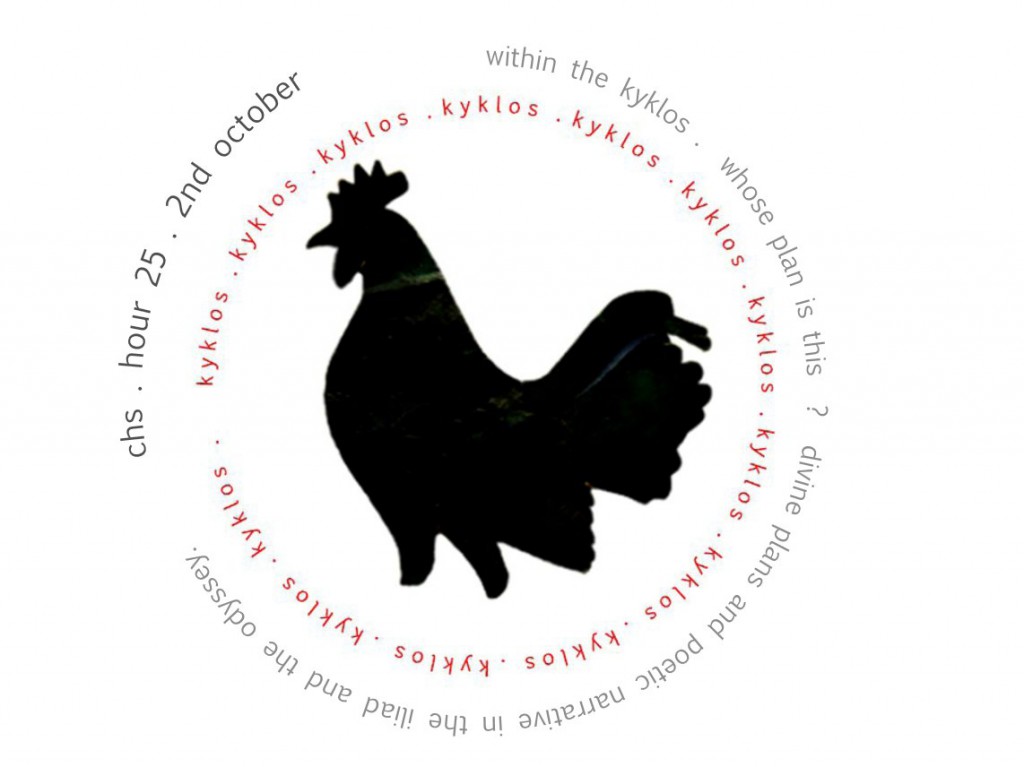We were pleased to welcome Efimia D. Karakantza (University of Patras, Greece), and Justin Arft (University of Missouri) for an Open House discussion: ‘Within the Kyklos: Whose plan is this? Divine plans and poetic narrative in the Iliad and Odyssey’.
This open discussion took place within the Kyklos, the intergenerational project of the CHS focusing on the Greek Epic Cycle and its interface with other genres, namely the Homeric Epics. From last year’s group of interlocutors the following question has arisen: do the divine plans (Zeus’ in the Iliad, Zeus’ and Athena’s vs Poseidon’s in the Odyssey) really define the plot and the structure of the poems, as is advertised by the poet at the outset of each poem? Do we have any other indications, based on the analysis of the narrative, showing that the poet manipulates both the divine plans and the mortals’ response to these?
Justin Arft, Ph.D. candidate at the University of Missouri and participant in the 2nd annual Kyklos teleconference, discussed the Odyssey‘s narrative plan as a complement to Professor Karakantza’s presentation on the Iliad. The Odyssey promises an explicit outcome in the form of Zeus and Athena’s divine plan, beneath which also lies a set of traditional expectations for how the hero’s return will proceed. In creative and playful response to what we might presume to know about Odysseus’ return home, the Odyssey displays a “poetics of suspense and delay” within the Phaeacian episode that interrupts and redirects the audience’s expectations, leaving fates open ended or cleverly resolved in retrospect. In the end, our hero is guaranteed his return, but perhaps not on along the anticipated path.
We met to discuss this exciting issue: do Homer, and Zeus, Athena and Poseidon cross swords? Who has the upper hand in the making of the epics? At the end of the day, whose plan is this?
You can watch the event on our YouTube channel, or in the frame below:
If you have comments, questions, or observations about the passages and themes discussed, members can start and continue conversation associated with this event on this thread in the Forum.
Focus passages from Iliad are:
Iliad I, 5
Iliad I, 503–510
Iliad II, 3–4
Iliad VIII, 473–477
Iliad XV, 61–68
Iliad XV, 69–71
Iliad IX, 649–655
Iliad XVI
and from Odyssey:
Narrative Plan
Odyssey i 1–21
Odyssey v 29–41
Odyssey v 282–290
Arete’s Delayed Role
Odyssey vi 297–315
Odyssey vii 48–77
Odyssey vii 237–239
Odyssey vii 308–329
Odyssey xi 326–341
Suspended Fate of the Phaeacians
Odyssey viii 550–576
Odyssey xiii 125–187
Selected references mentioned during the discussion:
Open House Discussion with Classicist and Jazz Musician Graeme Bird (video discussion)
Jonathan S. Burgess: The Death and Afterlife of Achilles (Johns Hopkins University Press)
Jim Marks: Zeus in the Odyssey
Gregory Nagy: “Was there a future for the Phaeacians of the Homeric Odyssey? (audio and PDF)
Classics@ Volume 6: Reflecting on the Greek Epic Cycle Efimia D. Karakantza, ed. The Center for Hellenic Studies of Harvard University, online edition of December 20, 2010
~ Look out for a link to Justin Arft’s paper when it is published at Kyklos@ ~
Efimia D. Karakantza
Efimia D. Karakantza is Assistant Professor of Ancient Greek Literature at the University of Patras, Greece, where she has taught since 2007. Her degrees are from the Aristotle University of Thessaloniki (BA in Classics 1986) and Reading University (PhD in Classics 1993). She is a Fellow in Ancient Greek Literature of the Center for Hellenic Studies, University of Harvard. She directs for the Center the project Kyklos, an international student oriented research program on the Greek Epic Cycle. Most of her publications have been on Homer, Attic drama and Greek myths. She published a book on Ancient Greek myths. The 20th century discourse on their nature and function (Athens 2004, in Greek). She is the co-editor of the volume on Light and darkness in ancient Greek myths and religion (Lexington Books, Lanham, 2010). Her recent publications on The Suppliants, Ajax, Oedipus Tyrannus and Electra explore aspects of the political discourse in Attic drama, and her current project is a book on Sophocles titled: Apolis. A reading of Sophoclean tragedy.
Justin Arft
Justin Arft is a Ph.D. Candidate at the University of Missouri specializing in Homer, archaic Greek poetry, and oral poetics. He has recently written “Immanent Thebes: Traditional Resonance and Narrative Trajectory in the Odyssey,” (2014; Trends in Classics, 6.2) and co-authored a chapter with John Miles Foley (“The Epic Cycle and Oral Tradition”) in The Greek Epic Cycle and its Ancient Reception: A Companion (2015; Cambridge). Justin also holds an M.A. in Religious Studies from the University of Missouri and has taught courses in Religious Studies since 2007 and served as a Graduate Teaching Assistant in Classical Studies since 2010. Justin is the managing editor of Oral Tradition.
